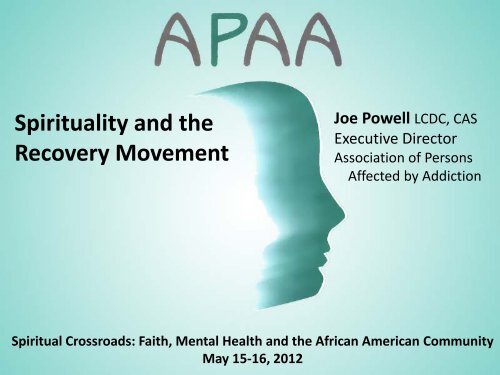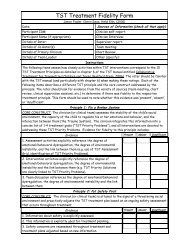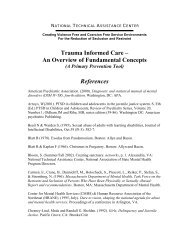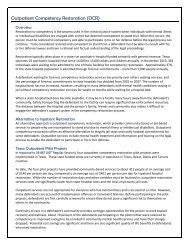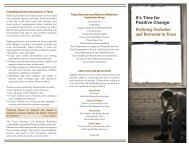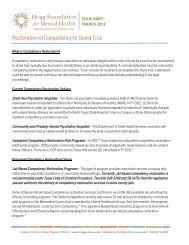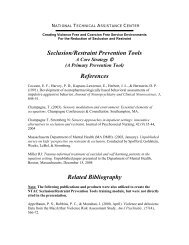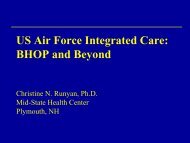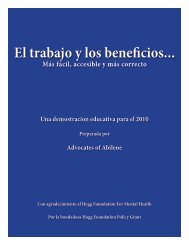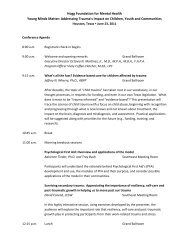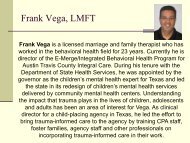Spirituality and the Recovery Movement - Hogg Foundation for ...
Spirituality and the Recovery Movement - Hogg Foundation for ...
Spirituality and the Recovery Movement - Hogg Foundation for ...
- No tags were found...
Create successful ePaper yourself
Turn your PDF publications into a flip-book with our unique Google optimized e-Paper software.
<strong>Spirituality</strong> <strong>and</strong> <strong>the</strong><strong>Recovery</strong> <strong>Movement</strong>Joe Powell LCDC, CASExecutive DirectorAssociation of PersonsAffected by AddictionSpiritual Crossroads: Faith, Mental Health <strong>and</strong> <strong>the</strong> African American CommunityMay 15-16, 2012
God Given to be of Service in our CommunitySAMHSA Peer to Peer <strong>Recovery</strong> Community Support Serviceso Grant awards : 1998 (3 year grant) <strong>and</strong> 2003 (4 year grant)Target population:o Peers in or seeking recovery from substance use/addictiono Family memberso Three Guiding Principles - <strong>Recovery</strong> First, Inclusion & Au<strong>the</strong>nticityHours of Operation: Mon-Fri 9 am to 8pm, Sat 12-6pmMonthly average services per peer group 2,181Monthly Peer <strong>Recovery</strong> Coaching sessions 527Average daily visitors 2010 41Peer support groups each week 25-30Staff17 Peers in recovery3 Family member20 Full-time <strong>and</strong> 101 volunteers
Spiritual Objectives1. Overview of <strong>the</strong> roles religion <strong>and</strong> spirituality have playedin mental health/addiction recovery in America over <strong>the</strong>past years.2. Highlight <strong>the</strong>mes <strong>and</strong> lessons drawn from this spiritualhistory of addiction <strong>and</strong> mental health in <strong>the</strong> AfricanAmerican Community.3. Show <strong>the</strong> spiritual impact of <strong>the</strong> recovery movement at alocal, state <strong>and</strong> federal level.
In Our Own Voiceby Vanessa Jackson“The depth of spiritual wounding thatcan occur when an individual is cutoff from his or her religiouscommunity or, even worse, whenreligion is used to fur<strong>the</strong>r abusepeople, is incredible. On <strong>the</strong> o<strong>the</strong>rh<strong>and</strong>, <strong>the</strong> power that spirituality hasto heal <strong>and</strong> to restore a survivor’ssense of self <strong>and</strong> serve as a vehicle<strong>for</strong> reconnection to community isequally powerful.”
The Power of <strong>Recovery</strong>In Our own Voiceo The telling of stories has been an integral partof <strong>the</strong> history of people of African descent.o From <strong>the</strong> griots of ancient Africans to <strong>the</strong> sometimespainful lyrics of hip-hop artists, people of Afric<strong>and</strong>escent have known that our lives <strong>and</strong> our storiesmust be spoken, over <strong>and</strong> over again, so that <strong>the</strong> peoplewill know our truth.o Over come illness <strong>and</strong> heal our communities. - JP
The Colored Temperance <strong>Movement</strong>Frederick Douglass’pledge in 1845 Black Temperance Societies- Role of <strong>the</strong> Black Church in addressing alcohol problems
FREDERICK DOUGLASSSlave Abolitionist“These holidays serve as conductors, or safety valves, tocarry off <strong>the</strong> rebellious spirit of enslaved humanity….When aslave was drunk, <strong>the</strong> slave holder had no fear that he wouldplan an insurrection; no fear that he would escape to <strong>the</strong>north. It was <strong>the</strong> sober, thinking slave who was dangerous,<strong>and</strong> needed <strong>the</strong> vigilance of his master to keep him a slave.”(Douglass, 1855, p. 256)
Our Rationaleo The African American church is <strong>the</strong> largest <strong>and</strong>oldest human service provider in <strong>the</strong> AfricanAmerican community.o It is also <strong>the</strong> institution with <strong>the</strong> most credibility.o Untapped resources (human <strong>and</strong> financial).
Spiritual Support in <strong>the</strong> Church <strong>and</strong> Communityo Mental illness <strong>and</strong> substance use, particularly HIV, HCV,family violence, criminal justice system, homelessness, etc.ei<strong>the</strong>r directly or indirectly impact <strong>the</strong> entire Black Church.o The African American church offers an abundance ofresources that can be used <strong>for</strong> reaching persons who aremarginalized or disenfranchised.o These realities make it imperative that we continue ourcollaboration with churches in <strong>the</strong> development <strong>and</strong>implementation of <strong>Recovery</strong> Community education <strong>and</strong>support.
History of Addiction/Alcoholismo AA, religion & <strong>the</strong> evolution of <strong>Recovery</strong> Mutual Aid SocietiesEleventh Step Groupso Christo Alcoholics Victorious (1948)o Overcomers Outreach (1977)o JACS (1979) Matt Talbot Retreat <strong>Movement</strong> (1941)o Calix Society (1947) Christ Centered Twelve Step Programso Liontamers Anonymous (1980) Extension of Twelve Stepso Millati Islami
Historical Religious & Spiritual Supporto Harlem Club of Former Alcoholic Degenerates -- Emmanuel <strong>Movement</strong>& Jacoby Clubo The rise of juvenile narcotic-addiction in urban communities of <strong>the</strong>1950s sparked <strong>the</strong> involvement of Christian churches in <strong>the</strong> addictionsarena. Such activities included outreach programs like:o The work of Fa<strong>the</strong>r Daniel Egan (<strong>the</strong> “Junkie Priest”), communitycounseling clinics such as Saint Mark’s Clinic in Chicago (1954) <strong>and</strong> <strong>the</strong>Addict’s Rehabilitation Center in Manhattan (1957), <strong>and</strong> faith-basedtreatment communities <strong>and</strong> sober-living environments such asSamaritan Halfway.o Society (1958), Exodus House (1958), Teen Challenge (1961), <strong>and</strong> VillageHaven (1962). The Phoenix House.
Government Response to Addiction Problemso In <strong>the</strong> late 1960s <strong>and</strong> early 1970s, a federal, state <strong>and</strong> localpartnership was <strong>for</strong>ged to create community-based alcoholismtreatment programs across <strong>the</strong> United States.o Treatment programs initiated by <strong>the</strong> anti-poverty <strong>and</strong> mentalhealth programs of <strong>the</strong> 1960s were significantly exp<strong>and</strong>ed in<strong>the</strong> 1970s under <strong>the</strong> sponsorship of National Institute onAlcohol Abuse <strong>and</strong> Alcoholism (NIAAA) <strong>and</strong> National Instituteon Drug Abuse (NIDA).
Zero ToleranceRetreat through <strong>the</strong> 1980s <strong>and</strong> early 1990s cultural <strong>and</strong> policy shiftso Re-stigmatization – fear, shame <strong>and</strong> “crazy”o De-medicalization – addiction not treated as a chronic diseaseo Re-criminalization – prison/jails as <strong>the</strong> new mental Institution
Historical Treatment & <strong>Recovery</strong>o 1980s brought a heightened interest in <strong>the</strong> history of alcohol <strong>and</strong>o<strong>the</strong>r drug problems in <strong>the</strong> African American community.(Herd, 1983, 1985)o A growing body of literature calling <strong>for</strong> cultural frameworks <strong>for</strong>underst<strong>and</strong>ing <strong>and</strong> responding to <strong>the</strong> treatment of AOD problems(Peter Bell <strong>and</strong> Evans, 1981), including calls <strong>for</strong> responses to <strong>the</strong>special needs of addicted African American women.(Corrigan <strong>and</strong> Anderson, 1982).o This period also witnessed <strong>the</strong> creation of organizations such as <strong>the</strong>National Black Alcoholism <strong>and</strong> Addictions Council <strong>and</strong> <strong>the</strong>Institute on Black Chemical Abuse.
Spiritual <strong>Recovery</strong> & Treatmento The 1980s <strong>and</strong> 1990s witnessed attempts to adapt traditionalrecovery support structures, such as Alcoholics Anonymous <strong>and</strong>Narcotics Anonymous, <strong>for</strong> increased cultural relevance, as wellas attempts to develop culturally sensitive <strong>and</strong> competenttreatment. (Mark S<strong>and</strong>ers, 1993)o There were also a growing number of indigenous addictionrecovery movements within African American communities.Five such recovery movements include <strong>the</strong> following.
Religious <strong>and</strong> spiritual <strong>Recovery</strong>Advocacy Pioneerso Rev. Cecil Williams Glide Memorial &o Fa<strong>the</strong>r Clements-One Church-One-Addict, Free N’ Oneo New Faitho Faith-based <strong>Recovery</strong>Support Structureso Free N’ Oneo Victorious Ladyo Celebrate <strong>Recovery</strong>
Glide Memorial Methodist Churcho 80% of <strong>the</strong> congregants are working on recovery.o The program is culturally based.o Pastor Cecil Williams believes that African Americansneed a recovery ef<strong>for</strong>t that takes <strong>the</strong>ir culture intoconsideration, recognizes <strong>the</strong>ir history <strong>and</strong> sociallyspirited manner of relating to each o<strong>the</strong>r.o Most of <strong>the</strong> members of Glide Church had triedtraditional 12-step groups prior to joining Glide <strong>and</strong> feltisolated, as many were <strong>the</strong> only African Americans or<strong>the</strong> only individuals addicted to crack in <strong>the</strong> group.
One Church-One Addicto Founded by <strong>the</strong> renowned Fa<strong>the</strong>r George Clements in 1993.o Purpose of <strong>the</strong> project is to recruit churches to helprecovering addicts maintain <strong>the</strong>ir recovery.o Currently, over 900 churches in 31 states are involved with<strong>the</strong> project.o At The Million Man March in October 1995, Fa<strong>the</strong>r Clementstalked about his plans to launch, “One Church-One Inmate.”o The goal is to recruit faith communities (churches, temples<strong>and</strong> synagogues) to provide post-release aftercare <strong>for</strong> men<strong>and</strong> women leaving prison.From source: Fa<strong>the</strong>r George Clements's Biography
Free – N - Oneo Founded in 1987 by Ronald Simmons in Los Angeles,Cali<strong>for</strong>nia.o Christian-centered recovery program that provides supportgroups <strong>for</strong> addicts <strong>and</strong> <strong>the</strong>ir family members.o Program has spread to African American churchesthroughout <strong>the</strong> country.o There are over 50 churches in Illinois alone holding Free-N-One meetings weekly.
Nation of Islamo The Nation of Islam is perhaps one of <strong>the</strong> most successful program inreaching African American male substance abusers in <strong>the</strong> criminaljustice system.o Ef<strong>for</strong>ts in <strong>the</strong> 1950s <strong>and</strong> ongoing today.o 1995, <strong>the</strong> author interviewed 10 African American males who werechemically dependent, with criminal pasts <strong>and</strong> who credited <strong>the</strong>irrecoveries to <strong>the</strong> Nation of Islam.o Some attended 12-step group meetings (Narcotics Anonymous)<strong>and</strong> were members of <strong>the</strong> Nation of Islam.
African American Survivors Organizationo Meeting begins with a reading entitled, “Who is aSurvivor?” <strong>and</strong> “What is an African American SurvivorsGroup Meeting?”o Followed by reading <strong>the</strong> Seven Principles of Nguza Saba,which are followed during a Kwanzaa celebration, <strong>and</strong> teachgroup members some of <strong>the</strong> principles of African culture.o Principles include unity, self-determination, collective works<strong>and</strong> responsibility, cooperative economics, purpose,creativity.o Responsibility to do as much as you can to leave yourcommunity more beautiful than how you found it.o Faith.
Public’s Perception Of “In <strong>Recovery</strong>”From Faces & Voices of <strong>Recovery</strong> – April 2004/Hart Research <strong>and</strong> Coldwater Corporation[National R<strong>and</strong>om phone survey N = 801] (APAA-Dallas, TX)When you hear <strong>the</strong> word “recovery, as in “This person is in recovery froman addiction,” what does “recovery” mean?Person is free fromaddiction/no longeruses D&A22%Person is trying to stopusing D&A62%Person has beendamaged by D&A8%Person has mental illness3%
<strong>Recovery</strong> by Any Means Necessary<strong>Recovery</strong> model is broad enough to embrace us who talk about <strong>the</strong>iraddictions in terms of disease <strong>and</strong> recovery, habit <strong>and</strong> choice, badness(crime) <strong>and</strong> re<strong>for</strong>mation, sin (demon-possessed) <strong>and</strong> redemption (Godtouched),cursed (<strong>for</strong> breaking cultural taboos) <strong>and</strong> healed, excess <strong>and</strong>harmony (balance), shame <strong>and</strong> honor (face), genocide <strong>and</strong>personal/cultural survival, or simply messed up <strong>and</strong> worn out (“sick <strong>and</strong>tired of being sick <strong>and</strong> tired”).~All Roads in <strong>Recovery</strong>
<strong>Recovery</strong> Definitiono <strong>Recovery</strong> from alcohol <strong>and</strong> drug problems is a process of changethrough which an individual achieves abstinence <strong>and</strong> improvedhealth, wellness, <strong>and</strong> quality of life.(CSAT 2005 Nat. <strong>Recovery</strong> Summit) Faces <strong>and</strong> Voices of <strong>Recovery</strong>o <strong>Recovery</strong> from substance dependence is a voluntarily maintainedlifestyle characterized by sobriety, personal health, <strong>and</strong>citizenship. (Betty Ford Institute, 2007)o Behavioral health recovery is a process of change wherebyindividuals work to improve <strong>the</strong>ir own health <strong>and</strong> wellness <strong>and</strong> tolive a meaningful life in a community of <strong>the</strong>ir choice while strivingto achieve <strong>the</strong>ir full potential.(Substance Abuse <strong>and</strong> Mental Health Services Administration2011)
<strong>Recovery</strong> Capitalo <strong>Recovery</strong> capital refers to <strong>the</strong> amount <strong>and</strong> quality ofinternal <strong>and</strong> external resources that one can bring to bearto initiate <strong>and</strong> sustain recovery from addiction.o A number of factors have been identified as predictors ofrecovery in short-term studies <strong>and</strong> constitute recoverycapital including: Cognitive recovery readiness Participation in 12-step fellowships Faith/spirituality/life meaning
Preventing Genetic Risk <strong>and</strong> AcquiredBiological Causes of Substance Use/AbuseFortunately, “risk factors are not predictive factors due toprotective factors,” <strong>and</strong> <strong>the</strong> risk of neurobehavioral disinhibitioncan be moderated by <strong>the</strong> protective factors stemming frominterventions in schools/communities <strong>and</strong> families(e.g. <strong>the</strong> Strong African American Families -SAAF Program,<strong>Recovery</strong> Community Organizations, Church).
President Barack Obama“Solutions to America’s challenges are being developed every day at <strong>the</strong>grassroots. Government should not be supplanting <strong>the</strong>se ef<strong>for</strong>ts,but supporting <strong>the</strong>m.”
Baseline <strong>Spirituality</strong>, Religiosity,Life Meaning <strong>and</strong> <strong>Recovery</strong>6.05.55.0Mean4.54.03.53.02.5NoYesSustained abstinent recovery at F1Spiritual well-beingLife meaningReligiosity
Pathways Pilot<strong>Spirituality</strong> <strong>and</strong> religion as recovery supportDescribe any religious/spiritual experience/ support that you have had asa significant part of your recovery hOrganized religion, church3812-step recovery program <strong>and</strong>fellowshipSpiritual God/HigherPower/spirituality3334Spiritualawakening/experience16Support from peers14God (non-specific)12None10Surrender/admittedpowerlessness8Community invoolvment,volunteer work/service20 5 10 15 20 25 30 35 40h Adds up to < 100% because up to 3 answers were coded
African American MusicArts <strong>and</strong> Addiction/<strong>Recovery</strong>Important experiences in <strong>the</strong> life of a people are expressed through<strong>the</strong> cultural media of language, music, literature, dance <strong>and</strong> art.More prominent African Americans are becoming public about <strong>the</strong>irrecovery from addiction.o Whoopi Goldbergo Samuel Jacksono Natalie Coleo Ray Charleso Jada Pinkett Smitho Mary J. Bligeo Tupaco Eminemo Whitney Houstono Richard Pryoro Len Biaso Dwight Goodeno Sammy Daviso Miles Daviso Billie Holidayo Charlie Parker
Faith-Based Organizations(FBOs)o FBOs have exp<strong>and</strong>ed <strong>the</strong> concept of choice by offering faith-basedoptions to African Americans who may have a more spiritualapproach to <strong>the</strong>ir recovery.o In many cases African Americans consider <strong>the</strong>m trustworthysources that were located within <strong>the</strong> client’s community <strong>and</strong> whowere unaffiliated with any <strong>for</strong>mal state or federal structure.o FBOs are particularly effective <strong>for</strong> engaging <strong>and</strong> retaining those ofus who had been incarcerated or had criminal records.
Faith & Community-Based Organizations(FBCOs)o FBCOs infused <strong>the</strong> culturally congruent support networks withrecovery support services such as transportation, child care,scriptural study groups, faith-based counseling, <strong>and</strong> peer-to-peersupport.o The inclusion of recovery support services has enhanced treatmentoutcomes <strong>and</strong> has helped peers to remain motivated <strong>and</strong> engagedin <strong>the</strong>ir communities.o FBCOs can counter <strong>the</strong> “spiritual malaise” or <strong>the</strong> results from guilt<strong>and</strong> shame <strong>for</strong> how addiction/mental health problems has affectedloved ones <strong>and</strong>, consequently, can hinder recovery.
Factors Pushing <strong>Recovery</strong> Focus<strong>Recovery</strong> <strong>Movement</strong> to a <strong>Recovery</strong> Oriented System of Care<strong>Recovery</strong>TreatmentTX<strong>Recovery</strong>Vision 1963-1970 Reality 2010
Factors Influencing This Changeo Emerging <strong>and</strong> energized recovery community–e.g. FAVOR, Christians in recovery, <strong>Recovery</strong> Centerso Research findings supporting ongoing, continuity of serviceso Value Options <strong>Recovery</strong> initiativeso Inclusion <strong>and</strong> evolvement of grassroots faith-based <strong>and</strong>community-based organizationso Changing norms <strong>and</strong> expectations as defined by <strong>the</strong> InstituteOf Medicine Quality Chasm reportso Recognition of many pathways to recoveryo Federal, state <strong>and</strong> local approaches to person-centered careo Betty Ford Institute – Definition of <strong>Recovery</strong>
<strong>Recovery</strong>-Oriented Systems of Care Approacho In <strong>the</strong> recovery-oriented systems of care approach,<strong>the</strong> treatment agency is viewed as one of manyresources needed <strong>for</strong> successful recovery integrationinto <strong>the</strong> community.o No one source of support is more dominant thanano<strong>the</strong>r.o Various supports need to work in harmony with <strong>the</strong>communities of color direction, so that all possiblesupports are working <strong>for</strong> <strong>and</strong> with <strong>the</strong> person inrecovery.Addiction Messenger, November 2007, Vol. 10 Issue 11,published by <strong>the</strong> Northwest Frontier ATTC.
ROSC support person-centered <strong>and</strong> self-directed approaches to care thatbuild on <strong>the</strong> personal responsibility, strengths, <strong>and</strong> resilience of individuals,families <strong>and</strong> communities to achieve health, wellness <strong>and</strong> recoveryfrom alcohol <strong>and</strong> drug problems.<strong>Recovery</strong>IndividualFamily VFaith/spiritualCommunityWellnessHealth
CostEffectivenessPerceptionOf CareROSC require an ongoing process of systems improvement thatincorporates <strong>the</strong> experiences of those in recovery, <strong>the</strong>irfamily members <strong>and</strong> community in health, home <strong>and</strong> purpose.Evidence-Based PracticePractice-Based EvidenceRetentionSocialServicesHousingAuthorityWellnessChild Welfare<strong>and</strong> FamilyServicesCultural HealthServicesEducationalHousing/TransportationSpiritualFamily/Child CareFinancialIndividualFamilyCommunityLegalHealth InsuranceAccess/Capacity<strong>Recovery</strong>Systems of CareServices & SupportsVSO & Peer SupportCase MgtDoD & Veterans AffairsAddictionServices SystemAlcohol/Drug TreatmentVocationalPTSD & Mental HealthOngoing Systems ImprovementHealth CareCriminal JusticeSystemSocial Connectedness<strong>Recovery</strong> Support ServicesHIV ServicesMental HealthSystemPrimary CareSystemVocational ServicesEmploymentReducedCrimeSafe & Drug-freeSafe HousingHealth
Five A’s of Healthcare Re<strong>for</strong>m <strong>for</strong> Africa AmericansAvailabilityooDoes <strong>the</strong> service exist where people live <strong>the</strong>ir lives(live, work, study, play, shop, worship, etc.)Can I learn <strong>and</strong> about it in <strong>the</strong> church?Accessibilityo Questions of ease <strong>and</strong> convenience to obtain <strong>and</strong> use <strong>the</strong> serviceso Wait time <strong>for</strong> appointment, wait time <strong>for</strong> serviceo Hours <strong>and</strong> days of operationo Travel time, travel access – by car, parking, public transportation – routes(any transfers? How many?, costs, availability, schedule, cab – ease ofgetting <strong>the</strong>re)o Costso Physical accessibilityo Child careCopyright © 2010 National Center<strong>for</strong> Cultural Competenceo Language, interpreters, translationGeorgetown Universityo Will <strong>the</strong> Church help me access healthcare?V. Jackson, Ph.D., NCCC, 2008
Af<strong>for</strong>dabilityo Costs to consumer <strong>and</strong> financial viability of service provider(eg., sliding fee scale, co-payments, deductibles, exclusions).o Ability to acquire third party coverage – eligibility rules, administrativeprocess/requirements to document eligibility (e.g., Birth certificates withraised seal, rent receipt in own name) – relationship between multiplefunding streams.Appropriatenesso <strong>Recovery</strong> correctness of service & support offered/provided <strong>for</strong> prevention<strong>and</strong> treatment- Screening <strong>and</strong> assessment tools, take cultural issues intoaccount in <strong>the</strong> construction, implementation.o Diagnoses are accurate <strong>and</strong> appropriate Interventions including medicationsare designed to achieve optimal outcomes, location of service (e.g., home,facility, school, church, etc.), level of restrictiveness of care, etc.Acceptabilityo Services believes that <strong>the</strong> services are congruent with cultural beliefs, values,community, recovery <strong>and</strong> world view.
Religious & Spiritual <strong>Recovery</strong>1. Trans<strong>for</strong>mative religious & spiritual experience constitutes alegitimate catalyst of addiction/mental health recovery2. Living in a community of shared experience, strength <strong>and</strong> hopeheightens <strong>the</strong> quality <strong>and</strong> stability of addiction/mental healthrecovery.3. <strong>Recovery</strong> is something more than <strong>the</strong> removal of alcohol &drugs/mental health family problems from an o<strong>the</strong>rwiseunchanged life, e.g., reconstruction of one’s relationship withGod, with o<strong>the</strong>rs <strong>and</strong> with oneself.4. Beyond <strong>Recovery</strong> often involves <strong>the</strong> embrace of core spiritualvalues, e.g., release, freedom, gratitude, humility, service work,giving back, tolerance <strong>and</strong> <strong>for</strong>giveness
Religious & Spiritual <strong>Recovery</strong>5. There is a long tradition of recovery carriers, “healers” —wounded healers in <strong>the</strong> addictions/mental health arena whouse <strong>the</strong>ir own healing as a plat<strong>for</strong>m to help o<strong>the</strong>rs.6. There is a long tradition of integrating religion, psychology<strong>and</strong> medicine in <strong>the</strong> treatment <strong>and</strong> recovery of addictivedisorders.7. The historical import of a single life can be enormous.
The future of our communityIn <strong>the</strong> future, treatment programs serving African Americanswill pioneer joint service delivery models with <strong>the</strong>se indigenousmovements <strong>and</strong> will use <strong>the</strong>se movements as part of <strong>the</strong> menuof recovery support services.The African American community is not a homogenouscommunity <strong>and</strong> no single recovery support structure can meet<strong>the</strong> needs of all its members who need such a structure.
Going Forward in <strong>Recovery</strong>o Develop a harmonious place, that allows <strong>for</strong> open dialogue<strong>and</strong> honest discussion.o Create a safe place where consumers are encouraged <strong>and</strong>responsible <strong>for</strong> speaking “<strong>the</strong> truth.”o A place where African Americans of faith can remove <strong>the</strong>irmask, be transparent <strong>and</strong> get healing.~McCreary 10/2010
Religious & Spiritual <strong>Recovery</strong> Local PartnersDallaso Friendship West Baptist Churcho “Free at last” Oak Cliff BibleFellowshipo Concord Baptisto Unity Churcho Corinth AA groupo Narcotics Anonymouso First Africa Churcho Golden Gateo Local Faith Partners of Afric<strong>and</strong>escentFort Wortho Black Churches Networko Mount Rose Baptist Churcho Greater New Hope MissionaryBaptisto Diocese of Fort Wortho Teen Challengeo Cenikor Treatment Centero Eastside Ministries of Fort Wortho Re-Entry Resources of Fort Wortho Volunteers of Americao MHMR
Religious <strong>and</strong> Spiritual ResourcesTexaso 12 Step Programo African American Churcho Rev. Dr. Robert GilmoreAmerica Honors <strong>Recovery</strong> Awardo Involve participants - ask audienceo Black United Fund of TexasNationalo 12 Step Programo African American Churcho July – Minority Health Montho Faces <strong>and</strong> Voices of <strong>Recovery</strong>o NAMI – Sharing HopeAfrican American Leaders
Community Journey of <strong>Recovery</strong>Over coming illness, trauma, mental Illness/addictionprovides recovery capital <strong>and</strong> capacity that must betold as proof that:o Everyone has something tocontribute to <strong>the</strong> communityo Everyone must be welcomeo The gift of recovery must beshared with family, community<strong>and</strong> a Higher Powero If not shared, <strong>the</strong> community <strong>and</strong>persons’ journey is incomplete
ResourcesSubstance Abuse <strong>and</strong> Mental Health Service Administrationwww.samhsa.gov/Texas Department of State Health Serviceswww.dshs.state.usAssociation of Persons Affected by Addictionwww.apaarecovery.org<strong>Recovery</strong> Monthhttp://www.recoverymonth.gov/National Leadership Council on African American BehavioralHealth (NLC)www.nlcouncil.com
Creating newpossibilities to befully human, mostpowerful <strong>and</strong> living<strong>the</strong> life we love inour community“<strong>Recovery</strong>by anymeansnecessary”


